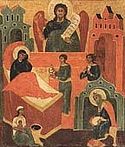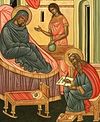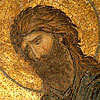

| Previous day | Next day |
| Old Style
May 25
|
Tuesday |
New Style
June 7
|
| 7th Week after Pascha. Tone 6. | No fast.
|
![]() Third Finding of the Precious Head of St. John the Baptist (ca. 850).
Third Finding of the Precious Head of St. John the Baptist (ca. 850).
Hieromartyr Therapontus, bishop of Cyprus (4th c.). St. Innocent (Borisov), archbishop of Kherson (1857). St. Thaddeus, archimandrite, of Svatogorsk Monastery (1758).
New Martyr Tavrion (Tolokontsev), monk, of Veliki Ustiug (1939).
St. Aldhelm, bishop of Sherborne (709). St. Bede the Venerable, hieromonk and chronicler, of Wearmouth and Jarrow (735). St. Gennadius, bishop of Astorga (ca. 936). Commemoration of the reunion of three million Uniates with the Orthodox Church at Vilnius in 1831. 1,290 New Martyrs of Piva (Montenegro), killed by the Nazis (1943).
Repose of Recluse George of Zadonsk (1836).
Thoughts for Each Day of the Year
According to the Daily Church Readings from the Word of God
By St. Theophan the Recluse

Tuesday. [Acts 21:26–32; John 16:2–13]
When he, the Spirit of truth, is come, he will guide you into all truth (John 16:13). Why is this source of knowledge not mentioned in books of rhetoric? It is not surprising that this point is not in pagan books of rhetoric, but why is it not in Christian ones? Can it be that when a Christian begins to philosophize he ought to cease being a Christian and forget all the true and unquestionable promises which were given to him? People often explain how to see and hear; they also teach well enough to make generalizations and inductions from what is seen and heard. But when the time comes to unravel the meaning of it all, here the nursling of logic is left to the devices of his own guesswork. Why not suggest to him: you have the revelations of the spirit of truth—follow them. They resolve the meaning of all existence and events in an indisputable manner, for they proceed from God, in Whom lies the source of existence itself. Perhaps all the guessing has multiplied so greatly that now all books (about God’s world) are filled with just guesses precisely because no one remembers to make that suggestion? It would be alright if these books were at least a little worthwhile; but it is clear at first glance that they are but the fruit of childish imagination.
Articles
 Nativity of the Holy Glorious Prophet, Forerunner and Baptist, John |
 Hieromartyr Therapon the Bishop of CyprusThe Hieromartyr Therapon, Bishop of Cyprus, lived a life of asceticism in a monastery, and afterwards he served as a bishop on the island of Cyprus. |
 Venerable Bede, the Church HistorianSaint Bede was a church historian who recorded the history of Christianity in England up to his own time. |













